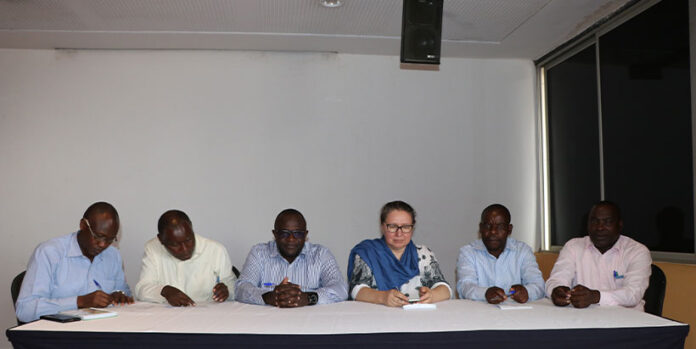
Smallholder farmers and their families in East Africa are set to benefit from a pact between the International Institute of Tropical Agriculture (IITA)–the Consortium of International Agricultural Research Centres (CGIAR) and six national agricultural research centers to enhance banana breeding and breeding impact in the region.
The agreement, Mchare and Matooke Regional Target Product Profiles signed during the recent East Africa Banana Network Meeting in Kampala Uganda, aims to develop and test new banana hybrids jointly in the highlands of Eastern Africa, following standardized breeding and testing procedures.
The agreement was signed by country banana research leads from Burundi, the Democratic Republic of Congo, Kenya, Rwanda, Uganda, and Tanzania in the presence of IITA Head of Breeding Hapson Mushoriwa and representatives of Genetic Innovation’s Accelerated Breeding Initiative. These countries represent about 40% of banana production in Africa, and this initiative marks the establishment and launch of the East African Banana Breeding Network, which aims to accelerate the delivery of improved banana varieties in the region.
Facing out traditional banana breeding processes
IITA Banana Crop Lead Rony Swennen highlighted the significance of the network, noting that traditional banana breeding processes are time-consuming and costly. He emphasized that through the network, breeding and testing can be expedited, with a focus on meeting specific country needs rather than solely relying on what breeders can offer. In the end, farmers will benefit more quickly from the new varieties.
Just like the breeding of all RTB crops—banana, cassava, potato, sweet potato, and yam—is being tackled together instead of on an individual crop basis, through the Bill & Melinda Gates Foundation-funded project, RTB Breeding, it is important and practical for NARS to also work together despite the different countries and realities they represent, so all benefit from the shared learning and intellectual cross pollination.
The network aims to streamline the breeding process by sharing breeding data collected by a few breeders. This collaborative effort will focus on product profile and market segmentation, product design, on-farm testing, product registration, and product launch in their respective countries.
To ensure a standardized and systematic flow of information for decision-making, the network will follow stages and gates of communications throughout the breeding process using the RAPID (Recommend, Input, Agree, Decide, Perform) model. These stages involve product design, trait deployment, crossing and screening, early testing, pre-commercial testing, product registration, and product introduction.
Breeders must pass through gate decisions, including crop strategy and product profile agreement, defining trait deployment strategy, selecting clones for preliminary yield trials, advancing candidates for on-farm trials, and advancing candidates for variety release to move to the next stage.
IITA Molecular Breeder Brigitte Uwimana advised, “NARS and breeders are encouraged to apply the stages and gates depending on what suits their work to adopt the framework of the communication flow.”
Transformative initiative
The banana network was well-received and commended by participants as a transformative initiative in accelerating regional banana improvement. NARS representative from Burundi Celestine Niyongere suggested, “I recommend we start by prioritizing the countries’ needs and demands and use the already available resources.”
Jules Bagula, the NARS representative from the Democratic Republic of Congo, expressed, “INERA is willing and ready to follow the Mchare and Matooke dissemination procedures. Moreover, the new network is an opportunity for DRC to improve its collaboration with CGIAR and other NARS involved in the region.”
Generose Nziguheba of VIB-IPBO emphasized that the participants should consider harmonization and data/protocol sharing by observing country policies and accepting the data from specific countries to enhance the efficiency of the network.
During the meeting, participants defined the network’s main activities and members’ responsibilities. All country representatives had the opportunity to nominate the network steering committee representative for their respective countries.
The chair of the steering committee is Rony Swennen (IITA) and members are Alex Barekye (NARO-Uganda), Mpoki Shimwela (TARI-Tanzania), Benjamin Kivuva (KALRO-Kenya), Mary Mwanga (KU-Kenya), Immaculee Nishimwe (RAB-Rwanda), Celestin Niyongere (ISABU-Burundi), Jules Ntamwira Bagula (INERA-DR Congo).
This collaboration marks a significant step towards enhancing banana breeding efforts in East Africa, focusing on meeting the specific needs of the region’s farmers and increasing food security and income through farming of improved cooking banana.








